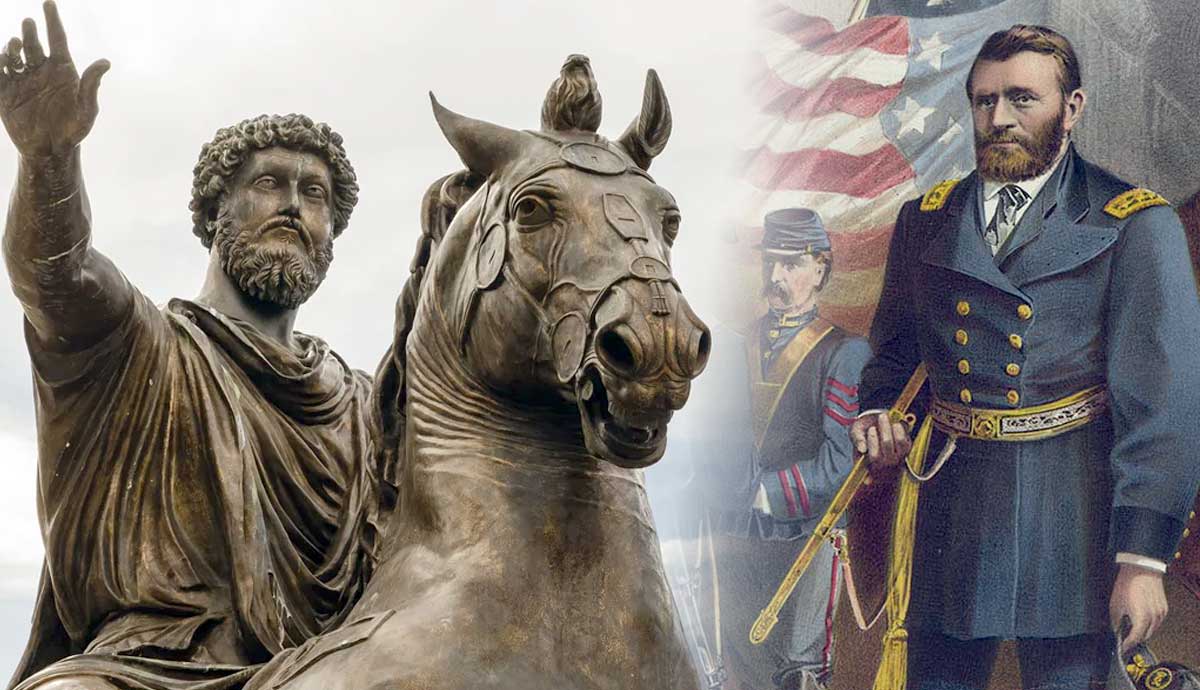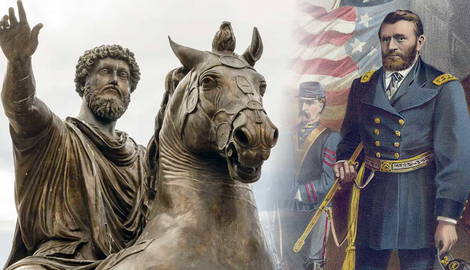
When the Roman Emperor Marcus Aurelius wrote down his personal memoirs while on a campaign against barbarian tribes in Germany, he could not have fathomed how practicing his Stoicism would help determine the outcome of battles across the globe far into the future. From Ulysses S. Grant and Theodore Roosevelt to General James Mattis, leaders have turned to Marcus Aurelius, sometimes called the Last Good Emperor, for advice and comfort in times of stress.
The Thoughts of Marcus Aurelius, the Philosopher King

The reign of the so-called Philosopher King, Marcus Aurelius, was fraught with warfare, plague, and political turmoil. He spent a lot of time defending the Roman empire from Germanic tribes while simultaneously contending with the Antoninus Plague, which crippled his army and his citizens. Throughout it all, he tried to adhere to his philosophy and recorded his thoughts in a journal entitled Meditations. He knew the only thing he truly had control over was his own mind and reasoned decisions. He knew that the obstacles in his path actually offered a way forward. Meditations survived the passage of time and later influenced notable leaders throughout history.
Stoicism is an Ancient Greek philosophical school founded by Zeno of Citium. The Stoics believed that virtue for its own sake is the path to a happy life. They also believed that events only affected us if we allowed them to. If things were beyond our control, then it was pointless to worry about them. Instead, we should accept them as part of the greater whole. Through this acceptance, we gain the mental clarity to solve life’s problems.
Marcus Aurelius learned about Stoicism as a child and tried to follow its teachings throughout his life. He did not allow fame and power to control his thoughts. He did not allow the weaknesses of others to erode his belief in the goodness of people. He constantly reminded himself of his own mortality, which helped him to keep things in perspective.
The Journal of the Ages

We know Aurelius spent his life in the pursuit of his philosophy. We have proof in the form of his personal journal, originally titled To Himself, which he wrote while on a military campaign in what is now Germany. Indeed, most of his career was spent on the outer fringes of the Roman Empire, defending its borders. It was while in the field that he wrote down his thoughts as a way of practicing his Stoic beliefs. He could not have known the influence these personal writings would have on people from every walk of life throughout the centuries after his death. During that time, his personal journal would become known as the Meditations.
Justice, self-control, acceptance, courage, and virtue are some of the main pillars of Stoicism. In Meditations, we find the most powerful man of his time giving himself daily reminders of these virtues and how, ultimately, they would always guide him in the proper direction. The influence of his writing is seen in countless examples of history’s great leaders. For some of these commanders, the influence is subtle. No direct reference was made to the writings. However, through their leadership style, we can see the emperor’s mindset at work. For others, a copy of Meditations could be found in their possession at any given time. Either way, they are often regarded as leaders who made more of a positive than a negative impact on the annals of history.
Ulysses S. Grant: The Fixer

There is no direct evidence that General Ulysses S. Grant, commander of all Union Armies towards the close of the American Civil War, had read Meditations. He did not reference the work in his memoirs, and he was always more prone to reading novels as opposed to philosophy. However, I would argue that the ideals found in Stoic philosophy, and especially the teachings of Marcus Aurelius, were not far from his consciousness at any one time.
Grant was, by all accounts, brave and calm under fire, committed and loyal to his cause, and unaffected by negative unfolding events. He took things in his stride and pushed forward to his objective. He spoke only when he had something meaningful to add. He maintained an even temperament most of the time and rarely, if ever, cursed. These are all examples of the type of Stoicism that Marcus Aurelius found to be important when attempting to live a good life. Grant’s success on the battlefield can be attributed to living these ideals.
Overcoming Obstacles

Late in the war, after Grant had assumed command of all United States Armies, he was forced to confront Confederate General Robert E. Lee and his army. Lee had bested all of Abraham Lincoln’s generals and had garnered an almost supernatural status among Union leadership. Grant would have none of it. Grant had fought a small battle at Belmont in southern Missouri earlier in the war. His opponent had left the field before his arrival, and shortly before the engagement, this made him realize something. Grant said in his memoirs that his enemy “had been as much afraid of me as I had been of him.”
He applied this to Lee. When faced with adverse reports from his officers about their inability to deal with Lee, Grant stated, “Let us not be concerned with what General Lee is going to do to us. Let us be concerned with what we are going to do to him.” As Aurelius would tell us, “The soul becomes dyed with the color of its thoughts” (Aurelius, 2002). Grant was warning his men about the pitfalls of self-defeat. Circumstances would only affect them negatively if they allowed it to be so. Grant knew Lee was the obstacle that stood between him and his goal. He focused on finding a way around it. As Aurelius says, “That which impedes action, furthers action. The obstacle becomes the way” (Aurelius, 2002). Grant emerged as the victor, with Lee surrendering to him at Appomattox Courthouse.
Theodore Roosevelt: The Rough Rider

Perhaps no American president better illustrates the idea of overcoming obstacles than Theodore Roosevelt. He embodied the ideals of Stoicism. Like Grant before him, Roosevelt was tenacious and steadfast. He grew up as a sickly child. He put himself through rigorous exercise and participated in sports to overcome his physical shortcomings. He suffered the tragic loss of his mother and first wife on the same day and navigated the treacherous world of politics throughout his life.
Roosevelt threw himself wholeheartedly into every endeavor he took on. He attended Harvard after being home-schooled, then became a successful writer, cattle ranger and deputy. He went on to become state assemblyman, New York City Police Commissioner, Assistant Secretary of the U.S. Navy, Commander of The “Rough Riders” during the Spanish-American War, Governor of New York, Vice President of the United States, and then President, all by the age of 42.
We know that Roosevelt was a student of Stoicism. He carried a copy of Meditations during a trek into the Amazon. A year after an assassination attempt left a bullet lodged within his chest, Roosevelt decided to survey uncharted areas of the Amazon River. He nearly died from disease during the trip, but he pressed on and completed the journey. During the assassination attempt, he insisted on delivering his speech before going to the hospital. As Marcus Aurelius said, “Choose not to be harmed, and you won’t feel harmed. Don’t feel harmed, and you haven’t been” (Aurelius, 2002).
James Mattis: The Warrior Monk

For a modern-day example, we turn to General James Mattis, the former Secretary of Defense and a Marine Corps commander. Mattis grew up in the Pacific Southwest in a home that emphasized education and reading. He rose through the ranks during his career and participated in the Gulf War, the War in Afghanistan, and the Iraq War. He advocated for a style of leadership that led from the front.
He was a somewhat progressive-minded man, known to be intelligent and well-read. He was plain of speech and did not pull punches. Throughout his career, he was known to always keep a copy of Meditations in the field and regularly consulted it. He advised against the U.S. removal of troops from Syria by the Trump administration to no avail and resigned shortly after. I can only speculate that Stoic teachings helped him decide to put his integrity and views before his career. As Marcus Aurelius would say, “It can ruin your life only if it ruins your character. Otherwise, it cannot harm you” (Aurelius, 2002).
Marcus Aurelius’ Enduring Influence

Marcus Aurelius could not have known the full influence he would have on the history of not only the Roman Empire but also countless times over the centuries that followed. The list includes founding fathers George Washington and Thomas Jefferson, Abraham Lincoln, and modern-day President Bill Clinton. Meditations exposes Marcus Aurelius’ inner struggle with sticking to his own virtues and ideals. In a world where fame, power, and leadership are routinely linked to corruption and greed, the Philosopher King shows us that those demons can be defeated and that we can stick to our virtues despite the constant pressure of today’s world. History has shown this to be true, not only by Aurelius himself but by those leaders throughout history who have followed his example.
Aurelius, M. (2002). The Meditations. Random House








